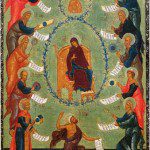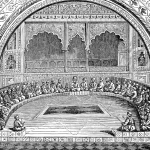
This was the way Minucius Felix would be able to demonstrate the ordinary belief in God held by the Romans. He said that they called upon God at their time of need showing their belief in one ultimate divinity despite whatever name or understanding they have for it. Foreshadowing, indeed, the apophatic direction theology would necessarily take to preserve the transcendence of God, he wrote down what his friend Octavius said to his pagan interlocutor:
He who thinks that he knows the magnitude of God, is diminishing it; he who desires not to lessen it, knows it not. Neither must you ask a name for God. God is His name. We have need of names when a multitude is to be separated into individuals by the special characteristics of names; to God, who is alone, the name God is the whole. If I were to call Him Father, you would judge Him to be earthly; if a King, you would suspect Him to be carnal; if a Lord, you will certainly understand Him to be mortal. Take away the additions of names, and you will behold His glory. What! Is it not true that I have in this matter the consent of all men? I hear the common people, when they lift their hands to heaven, say nothing else but Oh God, and God is great, and God is true, and if God shall permit. Is this the natural discourse of the common people, or is it the prayer of a confessing Christian? And they who speak of Jupiter as the chief, are mistaken in the name indeed, but they are in agreement about the unity of the power.[6]
Minicius Felix, therefore, presented how and why people can speak of God in error while still be speaking of the true God and offering worship to him. What we conceive in our minds about God, including the names we use for God, is less than God and to hold God to such predicates is to restrict him and to make him less than he is. People can be and will be mistaken as they represent God with poor predications. Nonetheless, this must not be used to deny it was the same God being addressed by all. It is not that such erroneous predications have no problems associated with them, for they certainly do and this was the foundation for pagan errors about the nature of divinity and human relationships with the divine. And yet behind all such error lies the truth which all naturally seek after and have in common. God is God for all. Whatever they know of God, however wrong their understanding of God is, they still are talking about God. We must hold to the greatness of God which transcends all our predication and start there to find out how we worship God in common with them.
If some would accuse the early Christian apologists of error, of going too far, we must remember that the apologists did not follow this line of reasoning on their own: they got it from the Apostle Paul. When, for example, Paul was with the pagans on Mars Hill, he showed how the statue of the Unknown God, the God who is beyond human knowing and comprehension, recognized and honored by the pagans, was the God of the Christians:
So Paul, standing in the middle of the Areopagus, said: “Men of Athens, I perceive that in every way you are very religious. For as I passed along, and observed the objects of your worship, I found also an altar with this inscription, `To an unknown god.’ What therefore you worship as unknown, this I proclaim to you (Acts 17:22-23 RSV).
Likewise, in the opening of the Book of Romans, this universal recognition of God was affirmed:
For what can be known about God is plain to them, because God has shown it to them. Ever since the creation of the world his invisible nature, namely, his eternal power and deity, has been clearly perceived in the things that have been made. So they are without excuse; for although they knew God they did not honor him as God or give thanks to him, but they became futile in their thinking and their senseless minds were darkened (Rom. 1:19-21 RSV).
The apologists took what was founded in these and other verses, and used them to explain the unity Christians had with the nations of the world. God was known by all, even if their knowledge was darkened by error. Yet, talking about them as errors only made sense if the recognition of one God over all was believed and worshiped by all had been sustained. If and when this is severed, then Christians not only cut themselves away from the rest of humanity, but from each other. For they would have nothing to sustain unity with each other. And so the position of Athenagoras, representative of the apologists as a whole, should give us a way to understand even today our relationships with other faiths:
Since, therefore, the unity of the Deity is confessed by almost all, even against their will, when they come to treat of the first principles of the universe, and we in our turn likewise assert that He who arranged this universe is God—why is it that they can say and write with impunity what they please concerning the Deity, but that against us a law lies in force, though we are able to demonstrate what we apprehend and justly believe, namely that there is one God, with proofs and reason accordant with truth? For poets and philosophers, as to other subjects so also to this, have applied themselves in the way of conjecture, moved, by reason of their affinity with the afflatus from God, each one by his own soul, to try whether he could find out and apprehend the truth; but they have not been found competent fully to apprehend it, because they thought fit to learn, not from God concerning God, but each one from himself; hence they came each to his own conclusion respecting God, and matter, and forms, and the world. But we have for witnesses of the things we apprehend and believe, prophets, men who have pronounced concerning God and the things of God, guided by the Spirit of God.[7]
God who is God over all transcends all human conceptions of him, though we will all try to come to terms with him with concepts used to describe him. Without revelation to correct us, it is understandable why we will make mistake after mistake, mistake building upon mistake, leading us further and further away from a proper understanding of who God is. Revelation is the corrective to natural theology. But natural theology needs to be recognized and serve as the foundation by which we can explore such revelation, for without it, we will have nothing to hold onto to explain why we should believe such revelation and truly we will become the atheists which the Romans claimed we were.
[1] The Martyrdom of Polycarp in ANF(1):41.
[2] Athenagoras, “A Plea for the Christians” in ANF(2):131.
[3] Ibid., 131.
[4] St. Justin Martyr, “First Apology” in ANF(1):169-70.
[5] St. Clement of Alexandria, “Exhortation to the Heathen” in ANF(2):191.
[6] Minucius Felix, Octavius in ANF(4): 183.
[7] Athenagoras, “A Plea for the Christians,” 132.
Stay in touch! Like A Little Bit of Nothing on Facebook:
A Little Bit of Nothing

















